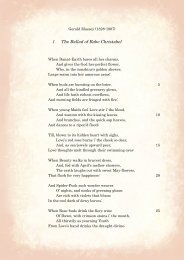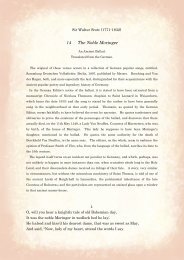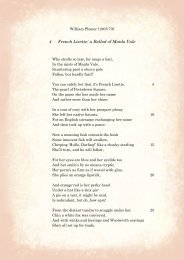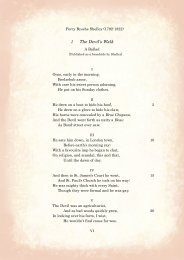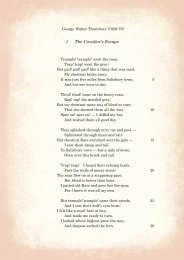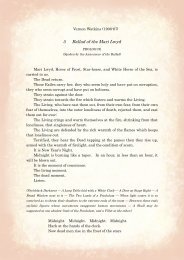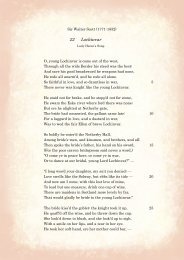1 The High Tide on the Coast of Lincolnshire, 1571
1 The High Tide on the Coast of Lincolnshire, 1571
1 The High Tide on the Coast of Lincolnshire, 1571
Create successful ePaper yourself
Turn your PDF publications into a flip-book with our unique Google optimized e-Paper software.
Jean Ingelow (1820-97)<br />
1 <str<strong>on</strong>g>The</str<strong>on</strong>g> <str<strong>on</strong>g>High</str<strong>on</strong>g> <str<strong>on</strong>g>Tide</str<strong>on</strong>g> <strong>on</strong> <strong>the</strong> <strong>Coast</strong> <strong>of</strong> <strong>Lincolnshire</strong>, <strong>1571</strong><br />
<str<strong>on</strong>g>The</str<strong>on</strong>g> old mayor climbed <strong>the</strong> belfry tower,<br />
<str<strong>on</strong>g>The</str<strong>on</strong>g> ringers ran by two, by three;<br />
“Pull, if ye never pulled before;<br />
Good ringers, pull your best,” quoth he.<br />
“Play uppe, play uppe, O Bost<strong>on</strong> bells! 5<br />
Ply all your changes, all your swells,<br />
Play uppe, ‘<str<strong>on</strong>g>The</str<strong>on</strong>g> Brides <strong>of</strong> Enderby!’”<br />
Men say it was a stolen tyde —<br />
<str<strong>on</strong>g>The</str<strong>on</strong>g> Lord that sent it, He knows all;<br />
But in myne ears doth still abide 10<br />
<str<strong>on</strong>g>The</str<strong>on</strong>g> message that <strong>the</strong> bells let fall:<br />
And <strong>the</strong>re was naught <strong>of</strong> strange, beside<br />
<str<strong>on</strong>g>The</str<strong>on</strong>g> flights <strong>of</strong> mews and peewits pied,<br />
By milli<strong>on</strong>s crouched <strong>on</strong> <strong>the</strong> old sea-wall.<br />
I sat and spun within <strong>the</strong> doore, 15<br />
My thread brake <strong>of</strong>f, I raised myne eyes!<br />
<str<strong>on</strong>g>The</str<strong>on</strong>g> level sun, like ruddy ore,<br />
Lay sinking in <strong>the</strong> barren skies;<br />
And dark against day’s golden death<br />
She moved where Lindis wandereth — 20<br />
My s<strong>on</strong>ne’s faire wife, Elizabeth.<br />
“Cusha! Cusha! Cusha!” calling,<br />
Ere <strong>the</strong> early dews were falling,<br />
Farre away I heard her s<strong>on</strong>g.<br />
“Cusha! Cusha!” all al<strong>on</strong>g, 25<br />
Where <strong>the</strong> reedy Lindis floweth,<br />
Floweth, floweth,<br />
From <strong>the</strong> meads where melick groweth,<br />
Faintly came her milking-s<strong>on</strong>g.<br />
“Cusha! Cusha! Cusha!” calling, 30<br />
“For <strong>the</strong> dews will so<strong>on</strong> be falling;<br />
Leave your meadow grasses mellow,
Mellow, mellow;<br />
Quit your cowslips, cowslips yellow;<br />
Come uppe, Whitefoot; come uppe, Lightfoot; 35<br />
Quit <strong>the</strong> stalks <strong>of</strong> parsley hollow,<br />
Hollow, hollow;<br />
Come uppe, Jetty, rise and follow,<br />
From <strong>the</strong> clovers lift your head;<br />
Come uppe, Whitefoot; come uppe, Lightfoot; 40<br />
Come uppe, Jetty, rise and follow,<br />
Jetty, to <strong>the</strong> milking-shed.”<br />
If it be l<strong>on</strong>g, aye, l<strong>on</strong>g ago,<br />
When I beginne to think howe l<strong>on</strong>g,<br />
Againe I hear <strong>the</strong> Lindis flow, 45<br />
Swift as an arrowe, sharpe and str<strong>on</strong>g;<br />
And all <strong>the</strong> aire it seemeth mee<br />
Bin full <strong>of</strong> floating bells (sayth shee),<br />
That ring <strong>the</strong> tune <strong>of</strong> Enderby.<br />
Alle fresh <strong>the</strong> level pasture lay, 50<br />
And not a shadowe mote be seene,<br />
Save where full fyve good miles away<br />
<str<strong>on</strong>g>The</str<strong>on</strong>g> steeple towered from out <strong>the</strong> greene;<br />
And lo! <strong>the</strong> great bell farre and wide<br />
Was heard in all <strong>the</strong> country side 55<br />
That Saturday at eventide.<br />
<str<strong>on</strong>g>The</str<strong>on</strong>g> swannerds where <strong>the</strong>ir sedges are<br />
Moved <strong>on</strong> in sunset’s golden breath,<br />
<str<strong>on</strong>g>The</str<strong>on</strong>g> shepherde lads I heard afarre,<br />
And my s<strong>on</strong>ne’s wife Elizabeth; 60<br />
Till floating o’er <strong>the</strong> grassy sea<br />
Came downe that kyndly message free,<br />
“<str<strong>on</strong>g>The</str<strong>on</strong>g> Brides <strong>of</strong> Mavis Enderby.”<br />
<str<strong>on</strong>g>The</str<strong>on</strong>g>n some looked uppe into <strong>the</strong> sky,<br />
And all al<strong>on</strong>g where Lindis flows, 65<br />
To where <strong>the</strong> goodly vessels lie,<br />
And where <strong>the</strong> lordly steeple shows.<br />
<str<strong>on</strong>g>The</str<strong>on</strong>g>y sayde, “And why should this thing be,<br />
What danger lowers by land or sea?<br />
<str<strong>on</strong>g>The</str<strong>on</strong>g>y ring <strong>the</strong> tune <strong>of</strong> Enderby! 70
“For evil news from Mablethorpe,<br />
Of pyrate galleys warping downe;<br />
For shippes ashore bey<strong>on</strong>d <strong>the</strong> Scorpe,<br />
<str<strong>on</strong>g>The</str<strong>on</strong>g>y have not spared to wake <strong>the</strong> towne;<br />
But while <strong>the</strong> west bin red to see, 75<br />
And storms be n<strong>on</strong>e, and pyrates flee,<br />
Why ring ‘<str<strong>on</strong>g>The</str<strong>on</strong>g> Brides <strong>of</strong> Enderby’?”<br />
I looked without, and lo! my s<strong>on</strong>ne<br />
Came riding downe with might and main,<br />
He raised a shout as he drew <strong>on</strong>, 80<br />
Till all <strong>the</strong> welkin rang again,<br />
“Elizabeth! Elizabeth!”<br />
(A sweeter woman ne’er drew breath<br />
Than my s<strong>on</strong>ne’s wife Elizabeth.)<br />
“<str<strong>on</strong>g>The</str<strong>on</strong>g> old sea-wall (he cried) is downe, 85<br />
<str<strong>on</strong>g>The</str<strong>on</strong>g> rising tide comes <strong>on</strong> apace,<br />
And boats adrift in y<strong>on</strong>der towne<br />
Go sailing up <strong>the</strong> market-place.”<br />
He shook as <strong>on</strong>e that looks in death:<br />
“God save you, mo<strong>the</strong>r!” straight he saith; 90<br />
“Where is my wife Elizabeth?”<br />
“Good s<strong>on</strong>ne, where Lindis winds away,<br />
With her two bairns I marked her l<strong>on</strong>g;<br />
And ere y<strong>on</strong> bells beganne to play,<br />
Afar I heard her milking-s<strong>on</strong>g.” 95<br />
He looked across <strong>the</strong> grassy sea,<br />
To right, to left, “Ho, Enderby!”<br />
<str<strong>on</strong>g>The</str<strong>on</strong>g>y rang “<str<strong>on</strong>g>The</str<strong>on</strong>g> Brides <strong>of</strong> Enderby!”<br />
With that he cried and beat his breast;<br />
For lo! al<strong>on</strong>g <strong>the</strong> river’s bed 100<br />
A mighty eygre reared his crest,<br />
And uppe <strong>the</strong> Lindis raging sped.<br />
It swept with thunderous noises loud;<br />
Shaped like a curling, snow-white cloud,<br />
Or like a dem<strong>on</strong> in a shroud. 105<br />
And rearing Lindis backward pressed,
Shook all her trembling bankes amaine;<br />
<str<strong>on</strong>g>The</str<strong>on</strong>g>n madly at <strong>the</strong> eygre’s breast<br />
Flung uppe her weltering walls again.<br />
<str<strong>on</strong>g>The</str<strong>on</strong>g>n bankes came down with ruin and rout — 110<br />
<str<strong>on</strong>g>The</str<strong>on</strong>g>n beaten foam flew round about —<br />
<str<strong>on</strong>g>The</str<strong>on</strong>g>n all <strong>the</strong> mighty floods were out.<br />
So farre, so fast <strong>the</strong> eygre drave,<br />
<str<strong>on</strong>g>The</str<strong>on</strong>g> heart had hardly time to beat<br />
Before a shallow, seething wave 115<br />
Sobbed in <strong>the</strong> grasses at our feet:<br />
<str<strong>on</strong>g>The</str<strong>on</strong>g> feet had hardly time to flee<br />
Before it brake against <strong>the</strong> knee,<br />
And all <strong>the</strong> world was in <strong>the</strong> sea.<br />
Up<strong>on</strong> <strong>the</strong> ro<strong>of</strong>e we sat that night, 120<br />
<str<strong>on</strong>g>The</str<strong>on</strong>g> noise <strong>of</strong> bells went sweeping by;<br />
I marked <strong>the</strong> l<strong>of</strong>ty beac<strong>on</strong> light<br />
Stream from <strong>the</strong> church-tower, red and high —<br />
A lurid mark and dread to see;<br />
And awsome bells <strong>the</strong>y were to mee, 125<br />
That in <strong>the</strong> dark rang “Enderby.”<br />
<str<strong>on</strong>g>The</str<strong>on</strong>g>y rang <strong>the</strong> sailor lads to guide<br />
From ro<strong>of</strong>e to ro<strong>of</strong>e who fearless rowed;<br />
And I — my s<strong>on</strong> was at my side,<br />
And yet <strong>the</strong> ruddy beac<strong>on</strong> glowed: 130<br />
And yet he moaned beneath his breath,<br />
“O come in life, or come in death!<br />
O lost! my love Elizabeth.”<br />
And didst thou visit him no more?<br />
Thou didst, thou didst, my daughter deare! 135<br />
<str<strong>on</strong>g>The</str<strong>on</strong>g> waters laid <strong>the</strong>e at his doore,<br />
Ere yet <strong>the</strong> early dawn was cleare.<br />
Thy pretty bairns in fast embrace,<br />
<str<strong>on</strong>g>The</str<strong>on</strong>g> lifted sun sh<strong>on</strong>e <strong>on</strong> thy face,<br />
Downe drifted to thy dwelling-place. 140<br />
That flow strewed wrecks about <strong>the</strong> grass;<br />
That ebbe swept out <strong>the</strong> flocks to sea;<br />
A fatal ebbe and flow, alas!
To manye more than myne and mee:<br />
But each will mourn his own (shee sayth), 145<br />
And sweeter woman ne’er drew breath<br />
Than my s<strong>on</strong>ne’s wife Elizabeth.<br />
I shall never hear her more<br />
By <strong>the</strong> reedy Lindis shore,<br />
“Cusha! Cusha! Cusha!” calling, 150<br />
Ere <strong>the</strong> early dews be falling;<br />
I shall never hear her s<strong>on</strong>g,<br />
“Cusha! Cusha!” all al<strong>on</strong>g,<br />
Where <strong>the</strong> sunny Lindis floweth,<br />
Floweth, floweth; 155<br />
From <strong>the</strong> meads where melick groweth,<br />
When <strong>the</strong> water, winding down,<br />
Onward floweth to <strong>the</strong> town.<br />
I shall never see her more<br />
Where <strong>the</strong> reeds and rushes quiver, 160<br />
Shiver, quiver;<br />
Stand beside <strong>the</strong> sobbing river,<br />
Sobbing, throbbing in its falling,<br />
To <strong>the</strong> sandy, l<strong>on</strong>esome shore;<br />
I shall never hear her calling, 165<br />
“Leave your meadow grasses mellow,<br />
Mellow, mellow;<br />
Quit your cowslips, cowslips yellow;<br />
Come uppe, Whitefoot; come uppe, Lightfoot;<br />
Quit your pipes <strong>of</strong> parsley hollow, 170<br />
Hollow, hollow:<br />
Come uppe, Lightfoot, rise and follow:<br />
Lightfoot, Whitefoot,<br />
From your clovers lift <strong>the</strong> head;<br />
Come uppe, Jetty, follow, follow, 175<br />
Jetty, to <strong>the</strong> milking-shed.”<br />
1863<br />
(From G. B. Smith, ed. Illustrated British Ballads, Old and<br />
New. Vol. 1. L<strong>on</strong>d<strong>on</strong>, 1881)



